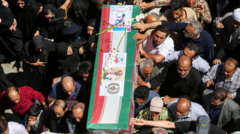The June 23 Israeli attack on Evin Prison has left 71 dead, as Iran's judiciary confirms deaths among political prisoners and staff, with families of detainees expressing deep concern over their loved ones' fates.
Casualties Rise in Iran Following Israel's Evin Prison Attack

Casualties Rise in Iran Following Israel's Evin Prison Attack
Iran reports 71 fatalities after an Israeli strike on a politically charged prison, escalating regional tensions.
Iran found itself grappling with rising tension following an Israeli air strike on Evin Prison, a facility notorious for housing political dissidents and activists. According to Iranian state media reports from June 29, the attack, which occurred on June 23, resulted in the deaths of 71 individuals, including prisoners, staff, and visiting relatives.
Asghar Jahangir, a spokesperson for Iran’s judiciary, revealed that the tragedy left families of detainees in turmoil, as many reported losing contact with their loved ones since the incident. The names of the deceased have not been disclosed, leaving families in distress and uncertainty.
Israel's Defense Ministry refrained from commenting on the allegations, while its military has not provided a statement regarding the airstrike. The veracity of Jahangir's claim remains unconfirmed by independent sources.
This attack was part of a broader military operation targeting various sites in Iran, including the headquarters of the Basij—a militia with a reputation for suppressing protests. The aftermath of the airstrike poses significant implications for Iran, which is already facing severe economic challenges and internal strife following a recent 12-day conflict with Israel and the U.S.
Amidst the turmoil, observers are questioning what actions Iran's leadership might take in light of what President Ebrahim Raisi referred to as “a golden opportunity for change.” The domestic situation remains volatile as the nation navigates the complex web of regional conflict and potential shifts in governance.






















